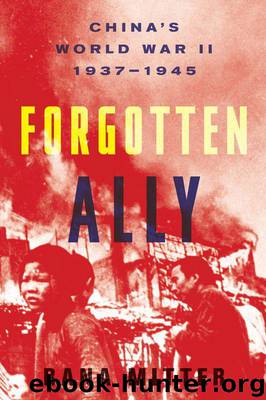Forgotten Ally: China's World War II, 1937-1945 by Mitter Rana

Author:Mitter, Rana [Mitter, Rana]
Language: eng
Format: mobi, epub
Publisher: Houghton Mifflin Harcourt
Published: 2013-09-09T16:00:00+00:00
PART IV
THE POISONED ALLIANCE
Chapter 13
Destination Burma
SINCE THAT TERRIBLE DAY in December 1941, they had been captives. Spring had come to Guangdong province, but the new season left missionary doctor Velva V. Brown and her American colleagues still in limbo, trapped in the city of Shantou (Swatow), on the south coast of China.
Brown had been stationed in China since 1923. The outbreak of war in 1937 had affected Shantou, particularly when Japanese bombs hit the city, but after the initial shock the majority of Americans stayed on. “Business as usual is our motto,” declared Brown to her family at home, as she struggled to keep the hospital going in the face of invasion and upheaval.1 But four years later, as the autumn of 1941 drew on, it became evident to all Americans in China that their protected status might not last. The American Baptist Foreign Mission Society sent out a cablegram on November 15 declaring “in view of increasingly critical developments we advise and urge that all women of mission, all men who are near retiring age or not in good health should return to United States . . . by first available passage.”2
On December 7 in China (December 6 in the United States) Brown and other missionaries huddled around the radio in the mission house, waiting for news from the last-ditch talks in Washington, DC, between Cordell Hull and the Japanese representatives, Ambassador Nomura Kichisaburô and special envoy Kurusu Saburô. (In Washington, Cordell Hull had little hope that peace could be negotiated, but wanted to seize the “one chance out of a hundred” that the two sides could avoid war. Hull reported that after a final, almost silent visit to his office, the two Japanese envoys “turned without a word and walked out, their heads down.”)3 Then, at 4:00 p.m. the next day, the Mission sent a message speaking of “the staggering news of the Japanese attack on Hawaii.”4 Their missionaries were caught behind what had suddenly become enemy lines. At home, President Roosevelt condemned the attack as a “date which will live in infamy.” “Next morning word came to us that war had been declared,” Brown wrote.5 Later that day, Japanese military police began the process of rounding up foreigners.
Until December 8, 1941, the war in China had been a distant concern for the Americans and the British, distracted at home by the Depression and then the war in Europe. For the many Westerners who remained in China after 1937, the war was an everyday reality, but their protected status as foreign neutrals always gave them some measure of distance as well as protection, particularly for those who remained in the zones controlled by the Japanese. Now, though, they were enemy aliens. All across eastern China, Americans and Britons were rounded up and interned. The International Settlement of Shanghai, for so long an oasis of neutrality in the midst of a war-torn city, was now reunified under Japanese control. In that city thousands of foreigners with Allied nationality were sent to holding camps.
Download
Forgotten Ally: China's World War II, 1937-1945 by Mitter Rana.epub
This site does not store any files on its server. We only index and link to content provided by other sites. Please contact the content providers to delete copyright contents if any and email us, we'll remove relevant links or contents immediately.
| Central Asia | Southeast Asia |
| China | Hong Kong |
| India | Japan |
| Korea | Pakistan |
| Philippines | Russia |
The Sympathizer by Viet Thanh Nguyen(4396)
The Rape of Nanking by Iris Chang(4217)
World without end by Ken Follett(3479)
Ants Among Elephants by Sujatha Gidla(3468)
Blood and Sand by Alex Von Tunzelmann(3206)
Japanese Design by Patricia J. Graham(3181)
The Queen of Nothing by Holly Black(2602)
City of Djinns: a year in Delhi by William Dalrymple(2557)
Foreign Devils on the Silk Road: The Search for the Lost Treasures of Central Asia by Peter Hopkirk(2467)
India's Ancient Past by R.S. Sharma(2457)
Inglorious Empire by Shashi Tharoor(2444)
Tokyo by Rob Goss(2434)
In Order to Live: A North Korean Girl's Journey to Freedom by Yeonmi Park(2393)
Tokyo Geek's Guide: Manga, Anime, Gaming, Cosplay, Toys, Idols & More - The Ultimate Guide to Japan's Otaku Culture by Simone Gianni(2374)
India's biggest cover-up by Dhar Anuj(2357)
The Great Game: On Secret Service in High Asia by Peter Hopkirk(2351)
Goodbye Madame Butterfly(2255)
Batik by Rudolf Smend(2188)
Living Silence in Burma by Christina Fink(2073)
